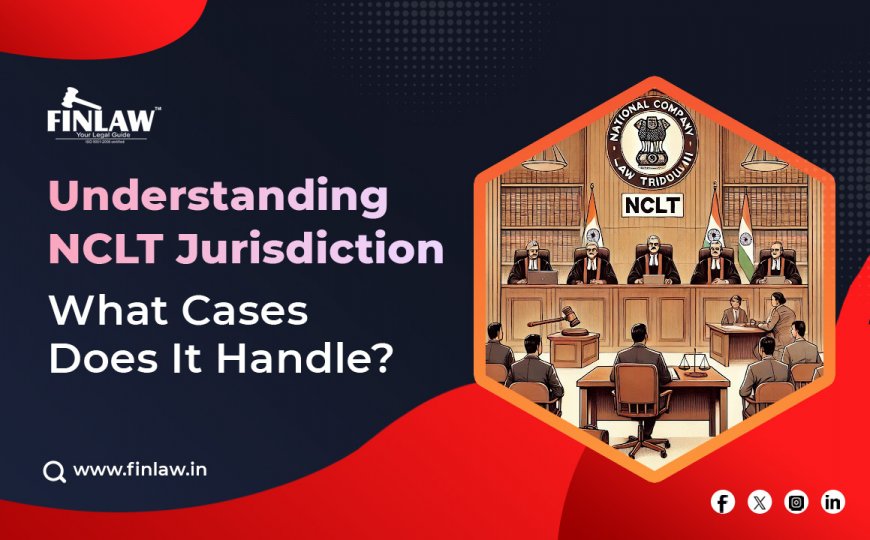Understanding NCLT Jurisdiction: What Cases Does It Handle?
Explore the jurisdiction of NCLT in India, covering insolvency, corporate disputes, mergers, and governance. Learn how NCLT handles company law matters.

The National Company Law Tribunal (NCLT) plays a crucial role in India's corporate legal framework, addressing a variety of company-related disputes and ensuring strong corporate governance. Established under the Companies Act, 2013, the NCLT has streamlined corporate dispute resolution and insolvency proceedings in India. This article delves into the jurisdiction of NCLT, exploring the types of cases it handles and its significance in India's legal landscape.
Establishment and Structure of the NCLT
The NCLT was constituted by the Central Government on June 1, 2016, under Section 408 of the Companies Act, 2013. It functions as a quasi-judicial authority, dealing with civil matters under the Act. The tribunal operates through multiple benches across India, with the Principal Bench in New Delhi and regional benches in cities like Ahmedabad, Bengaluru, Chennai, Kolkata, and Mumbai.
The NCLT is presided over by a President, who is typically a retired High Court judge, along with judicial and technical members. This composition ensures that corporate disputes are examined from both legal and technical perspectives, leading to well-rounded decisions. The tribunal follows a structured procedure, including case hearings, document submissions, and final judgments, which help streamline the adjudication process.
NCLT Jurisdiction and Powers
The jurisdiction of NCLT covers a broad spectrum of corporate issues, making it a central forum for resolving company law matters. Key areas under its purview include:
1. Company Law Matters
-
Registration and Incorporation Disputes: Resolving issues related to company registration and incorporation.
-
Oppression and Mismanagement: Handling shareholder disputes and mismanagement cases. Minority shareholders often approach the NCLT when their rights are being ignored or oppressed by the majority stakeholders.
-
Winding Up of Companies: Ordering the liquidation of companies on various grounds, such as inability to pay debts or acts against public interest.
2. Insolvency and Bankruptcy Proceedings
-
Corporate Insolvency Resolution: Overseeing corporate insolvency cases under the Insolvency and Bankruptcy Code (IBC), 2016. Creditors and financial institutions approach the NCLT to recover outstanding debts through a structured resolution process.
-
Liquidation: Appointing liquidators for corporate debtors in cases of failed resolution plans. If no viable resolution plan is proposed, the NCLT has the authority to order the company’s liquidation.
3. Mergers, Amalgamations, and Corporate Restructuring
-
Approval of Schemes: Ensuring legal compliance in mergers, demergers, and corporate restructuring. The tribunal examines whether the proposed scheme is fair, reasonable, and beneficial for all stakeholders.
-
Compromise and Arrangements: Facilitating arrangements between companies and their stakeholders, such as debt restructuring and share capital reductions.
-
Reduction of Share Capital: If a company intends to reduce its share capital, it must obtain approval from the NCLT to ensure the decision aligns with legal provisions and does not harm creditors.
4. Deposits and Debentures
-
Deposit-Related Disputes: Addressing disputes related to the acceptance and repayment of deposits. Investors and depositors can approach the NCLT if a company fails to repay deposits within the prescribed time.
-
Debenture Issues: Ensuring compliance in the issuance and redemption of debentures, protecting the rights of debenture holders.
5. Conversion of Public to Private Companies
-
Approval for Conversion: Granting approval for the conversion of public companies into private entities. This process requires an NCLT order to ensure that the rights of shareholders and creditors are not compromised.
Significant Cases Handled by the NCLT
1. Insolvency of Major Corporations
-
Essar Steel India Limited: Resolved under the IBC, ensuring significant debt recovery. The Supreme Court upheld the NCLT’s order, making it a landmark insolvency case in India.
-
Jet Airways: Handled the complex insolvency proceedings of the airline. The tribunal played a pivotal role in protecting creditors and restructuring the company’s debts.
-
Bhushan Steel: The NCLT approved the acquisition of Bhushan Steel by Tata Steel, setting a precedent for fast-tracked corporate insolvency resolutions.
2. Corporate Restructuring
-
Vodafone Idea Merger: Approved one of India's largest telecom mergers, highlighting the NCLT’s role in reviewing and approving large-scale corporate restructuring plans.
-
Reliance Infratel Case: The NCLT facilitated the resolution of Reliance Infratel’s debt by approving a resolution plan, safeguarding the interests of creditors and stakeholders.
3. Oppression and Mismanagement
-
Tata Sons vs. Cyrus Mistry: A landmark case concerning corporate governance disputes. The NCLT’s ruling was instrumental in setting legal precedents regarding directorial disputes and corporate governance.
-
Fortis Healthcare Case: Minority shareholders approached the NCLT over concerns of mismanagement and financial irregularities, leading to crucial reforms in the company’s operations.
Procedural Aspects of the NCLT
1. Filing of Applications and Petitions
-
Eligibility: Shareholders, creditors, and companies can file applications.
-
Procedure: Requires submission of necessary documents and fees. Legal representation is recommended to ensure proper compliance with the tribunal’s rules.
-
Timelines: NCLT aims to provide timely resolution, but complex cases may take longer depending on legal intricacies.
2. Hearing and Adjudication
-
Bench Composition: Judicial and technical members preside over cases.
-
Proceedings: Follow principles of natural justice, allowing parties to present their case. The hearings are structured, with opportunities for all parties to submit evidence and arguments before a final decision is made.
-
Digitization Efforts: Recent initiatives have introduced online filing and virtual hearings to expedite case resolutions.
3. Appeals
-
Appellate Authority: Decisions can be appealed before the National Company Law Appellate Tribunal (NCLAT) and the Supreme Court on legal grounds. If parties are dissatisfied with an NCLT order, they can escalate the matter to the higher judiciary for review.
Impact of NCLT Jurisdiction on India's Corporate Landscape
The jurisdiction of NCLT has significantly improved corporate dispute resolution by:
-
Enhancing Efficiency: Reducing litigation time and expediting corporate resolutions. The tribunal's structured approach ensures faster decision-making compared to traditional civil courts.
-
Strengthening Corporate Governance: Ensuring compliance with company law regulations, thereby fostering a more transparent business environment.
-
Facilitating Business Growth: Providing a structured mechanism for corporate restructuring and insolvency resolution, allowing businesses to recover from financial distress and continue operations.
-
Encouraging Investor Confidence: By providing a reliable mechanism for resolving corporate disputes, the NCLT enhances investor confidence, encouraging both domestic and foreign investments in India.
Conclusion
The NCLT plays a vital role in India's corporate legal system, addressing a wide range of disputes and ensuring effective enforcement of company laws. The jurisdiction of NCLT extends across various corporate matters, making it an indispensable institution for maintaining corporate order and stability in India.
What's Your Reaction?



















